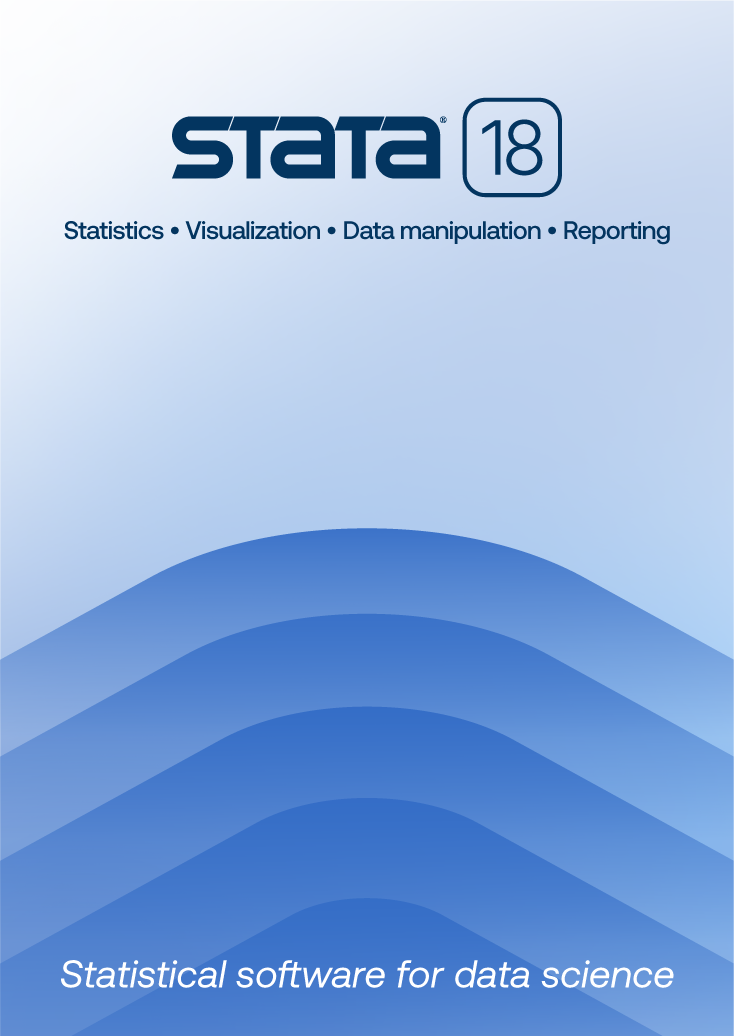
Time series
ARIMA •
ARFIMA •
ARCH/GARCH •
VAR •
SVAR •
instrumental-variables (proxy) SVAR •
VECM •
multivariate GARCH •
unobserved components model •
dynamic factors •
state-space models •
Markov-switching models •
business calendars •
correlograms •
periodograms •
forecasts •
impulse–response functions •
unit-root tests •
filters and smoothers •
rolling and recursive estimation •
Bayesian econometrics •
more
Forecasting
time-series and panel data •
multiple estimation results •
OLS, VARs, VECs, ARIMAs, ARCHs, 3SLS, and more •
one equation or thousands •
identities •
add factors and other adjustments •
dynamic or static (one-step-ahead) forecasts •
solve simultaneous systems •
more
Panel data
random and fixed effects with robust standard errors •
high-dimensional fixed effects •
linear mixed models •
random-effects probit •
GEE •
random- and fixed-effects Poisson •
dynamic panel-data models •
instrumental variables •
panel unit-root tests •
Bayesian panel-data models •
more
Lasso
lasso •
elastic net •
model selection •
prediction •
inference •
double selection •
partialing out •
cross-fit partialing out •
double machine learning •
continuous, binary, count, or time-to-event outcomes •
endogenous covariates •
more
Bayesian analysis
thousands of built-in models •
univariate and multivariate models •
linear and nonlinear models •
continuous, binary, ordinal, and count outcomes •
continuous univariate, multivariate, and discrete priors •
add your own models •
adaptive Metropolis–Hastings sampling •
Gibbs sampling •
convergence diagnostics •
posterior summaries •
hypothesis testing •
model comparison •
Bayesian econometrics •
more
Mata
matrix programming language •
optimization •
matrix inversions •
decompositions •
eigenvalues and eigenvectors •
LAPACK engine •
real and complex numbers •
string matrices •
numerical derivatives •
object-oriented programming •
large-scale development projects •
more
Python integration
Interact Stata code with Python code •
interchange data between Stata and Python •
pass results from Python back to Stata •
call Python libraries such as NumPy, matplotlib, Scrapy, scikit-learn, and more from Stata •
more
Import and export data
Excel .xls and .xlsx •
CSV •
Haver Analytics databases •
Federal Reserve Economic Data (FRED) •
any ODBC data source including Oracle, SQL Server, Access, MySQL, and DB2 •
custom SQL queries through ODBC •
more
Automated reporting and customizable tables
Automated reports •
customizable tables •
reproducible output •
Markdown •
HTML •
Word •
PDF •
Excel •
LaTex •
more
Intuitive and easy to use.
Once you learn the syntax of one estimator, graphics command,
or data management tool, you will effortlessly understand the rest.
Accuracy and reliability.
Stata is extensively and continually tested. Stata's tests produce
approximately 6 million lines of output. Each of those lines is
compared against known-to-be-accurate results
across editions of Stata and every operating system Stata supports to
ensure accuracy and reproducibility.
One package. No modules.
When you buy Stata, you obtain
everything for your statistical,
graphical, and data analysis needs. You do not need to buy separate modules
or import your data to specialized software.
Write your own Stata programs.
You can easily write your own Stata programs and commands. Share them
with others or use them to simplify your work. Utilize Stata's
do-files, ado-files, and Mata: Stata's own advanced programming
language that adds direct support for matrix programming. You can also
access and benefit from the thousands of existing Stata
community-contributed programs.
Extensive documentation.
Stata offers 35 manuals with more than 18,000 pages of PDF documentation
containing detailed examples, in-depth discussions, references to relevant literature,
and methods and formulas. Stata's documentation is a great place to learn about
Stata and the statistics, graphics, data management, and data science tools you
are using for your research.
Top-notch technical support.
Stata's technical support is known for their prompt, accurate,
detailed, and clear responses. People answering your questions have master's
and PhD degrees in relevant areas of research.
Join us for one of our free live webinars. Ready. Set. Go Stata shows you how to quickly get started manipulating, graphing, and analyzing your data. Or, go deeper in one of our special-topics webinars.

Stata's YouTube has over 300 videos with a dedicated playlist of methodologies important to economists. And, they are a convenient teaching aid in the classroom.

Get started quickly at using Stata effectively, or even learn how to perform rigorous time-series, panel-data, or survival analysis, all from the comfort of you home or office. NetCourses make it easy.
Stata Press offers books with clear, step-by-step examples that make teaching easier and that enable students to learn and researchers in finance, business, or marketing to implement the latest best practices in analysis.